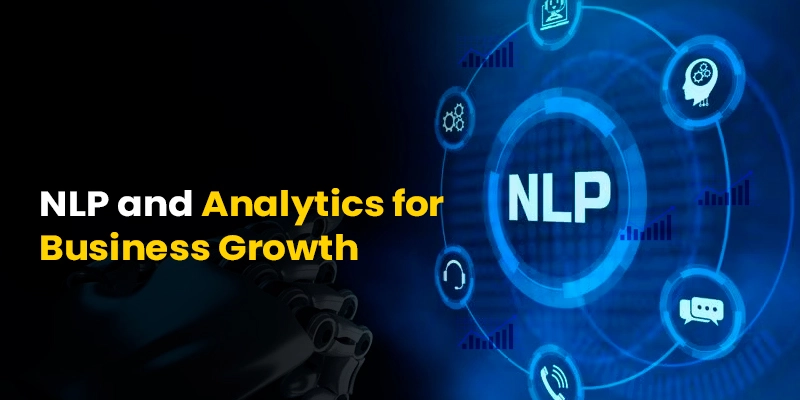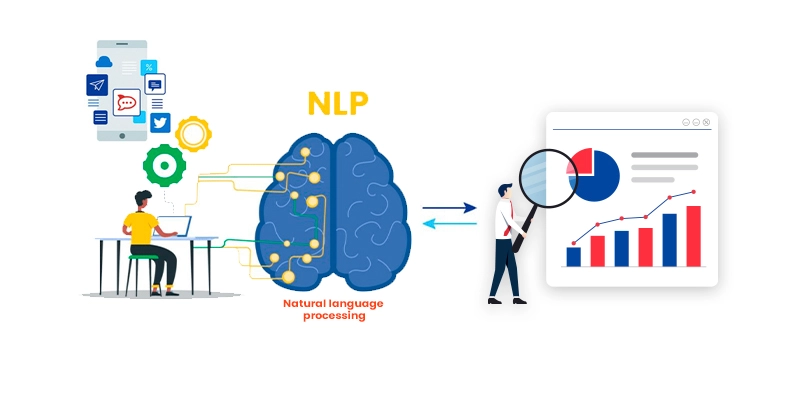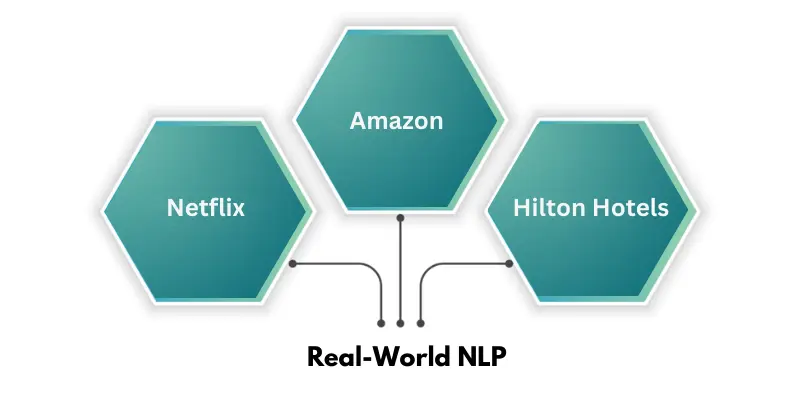In today’s data-driven world, businesses are constantly bombarded with information. From customer reviews, social media posts to internal documents and website traffic data, extracting valuable insights can be a daunting task. This is where the importance of data analysis comes in. The data analytics process is the science of extracting meaning from data to inform better decision-making. It encompasses various techniques and methodologies, each suited to answer specific questions and unlock hidden patterns.

This blog dives into the fascinating world of Natural Language Processing (NLP) and explores how it leverages different types of data analytics to empower businesses. We’ll uncover the difference between data analysis and data analytics, the importance of data analysis and how NLP transforms unstructured text data into actionable insights, ultimately driving growth and success.
Understanding the Power of Text Data
The amount of text data generated daily is staggering. From online reviews and social media conversations to customer emails and internal documents, businesses possess a goldmine of textual information. However, this data remains largely untapped unless harnessed through the power of NLP.
Natural Language Processing (NLP) is a sub-field of Artificial Intelligence (AI) that allows computers to interact with humans in their native language. NLP empowers computers with the ability to understand, interpret, and manipulate human language. NLP techniques can analyse vast amounts of text data, extract key information, and uncover hidden trends that would be impossible to detect manually.
What is Data Analyst?
Before we delve deeper into NLP, let’s clarify the key difference between data analysis and data analytics.
Data analysis refers to the broader process of inspecting, cleansing, transforming, and modelling data to discover useful information, inform conclusions, and support decision-making. A data analyst is the professional who performs this analysis, often using various tools and techniques.
Data analytics, on the other hand, is a specific field within data analysis that utilizes sophisticated statistical methods, machine learning algorithms, and specialized software to extract insights from complex datasets. So, while data analysis encompasses a broader range of activities, data analytics focuses on advanced techniques for uncovering hidden patterns and trends within data.
The surge in data, mainly text data, has fueled the demand for professionals skilled in extracting meaning and insights. MBA in Data Analytics are emerging to meet this growing need. These specialised programs equip graduates with the expertise to analyse vast amounts of textual information alongside traditional numerical data.
Importance of Data Analysis and the Data Analytics Process
As they increasingly rely on data to drive business decisions, organisations across all industries recognise the importance of data analysis and analytics. Here’s why:
- Improved Decision-Making: Data analysis and data analytics provide data-driven insights that can inform strategic decisions, optimise marketing campaigns, and improve resource allocation.
- Enhanced Customer Understanding: By analysing customer data (e.g., purchase history, reviews, social media interactions), businesses can understand their target audience, preferences and their pain points better. This allows for more customer-centric product development and personalised marketing strategies.
- Increased Operational Efficiency: Data analysis can identify areas for improvement in business processes, leading to streamlined operations, reduced costs, and increased efficiency.
- Risk Management: Data analysis helps identify potential risks and anomalies as they are occurring, allowing businesses to take proactive measures to mitigate them.
The data analytics process itself typically involves several steps:
- Data Collection: Identifying and gathering relevant data from various sources.
- Data Cleaning and Preparation: Ensuring the data is accurate, complete, and formatted consistently for analysis.
- Data Exploration: Delving the data to understand its characteristics, identify trends, and uncover potential relationships.
- Modelling and Analysis: By harnessing the power of statistics and machine learning, valuable insights can be extracted from data, enabling the creation of predictive models.
- Communication and Visualization: Presenting the findings clearly and concisely, often using data visualisation techniques like charts and graphs.
An MBA in Data Analytics in Chennai aims to equip graduates with the skills to excel in each stage of the data analytics process. The program provides a strong foundation in data analysis concepts, statistical methods, and machine learning algorithms. Data management techniques are explored in depth to ensure data accuracy and consistency.
Types of Data Analytics
Data analytics is a powerful tool, but it’s not a magic wand. There’s no single approach that works for every situation. The key lies in understanding the different types of data analytics and how they can be strategically combined to extract the most valuable insights.

Our previous blog post explored another type of data analytics – network analytics and how it helps businesses streamline operations and boost efficiency. But what if your data comes mainly from text sources like emails, reviews, or social media? That’s where Natural Language Processing (NLP) shines. NLP excels at analysing this type of textual data.
In this section, we’ll delve into how Natural Language Processing (NLP) leverages various data analytics techniques to unlock hidden gems of information and drive real business value. Let’s begin by exploring its role in the data analytics process, specifically within Descriptive Analytics.
Descriptive Analytics: Understanding What Happened
Descriptive analytics provides a basic understanding of your data. It answers fundamental questions like “what,” “when,” “where,” and “how many.” NLP can be a powerful tool for descriptive analytics by analysing text data to summarise key information.
- Example: Within the data analytics process, imagine analysing customer reviews to understand the overall sentiment (positive, negative, neutral) towards a new product launch. NLP can automatically categorise reviews and provide insights into customer satisfaction.
Diagnostic Analytics: Why Did It Happen?
Diagnostic analytics delves deeper, beyond simple descriptions, to uncover the “why” behind specific trends or patterns. NLP can be used to identify the root cause of customer complaints or analyse social media discussions to understand the reasons behind brand sentiment.
- For instance, to understand the reasons behind customer subscription cancellations, customer support tickets can be analysed using NLP. This analysis allows for identifying recurring themes or keywords associated with cancellations. By leveraging these insights gleaned from specific types of data analytics (text analysis through NLP), businesses can address specific customer concerns and implement strategies to improve customer retention.
Predictive Analytics: What Happens in the Future?

Predictive analytics uses past data and statistical models to forecast future trends and outcomes. NLP can play a crucial role in predictive analytics by analysing text data to predict customer churn, identify potential product defects mentioned in online reviews, or even forecast future market demands.
- Example: By analysing customer support inquiries and social media discussions, NLP can predict potential surges in demand for specific products during peak seasons. This allows businesses to optimise inventory management and avoid stockouts.
Prescriptive Analytics: What Should We Do?
Prescriptive analytics goes another level by recommending specific actions based on the insights gleaned from data. Through social media interactions or online reviews, NLP can personalise marketing campaigns based on customer preferences.
- Example: Customer reviews can be analysed to identify the features or functionalities most valued by customers. This analysis underscores the importance of data analysis, as it allows businesses to move beyond assumptions and gain deeper customer insights. Using NLP, personalised product recommendations can be generated based on a customer’s past purchases and reviews. This data-driven approach can potentially maximise customer satisfaction and sales opportunities.
Leveraging various data analytics techniques, NLP unlocks hidden gems of information and drives real business value. This is a key reason why the demand for NLP skills is increasing across various industries. MBA Courses in Chennai that incorporate NLP courses alongside traditional business disciplines could provide graduates with a solid competitive advantage in the job market.
Real-World NLP Case Studies

These real-world examples showcase how different businesses leverage NLP to unlock valuable insights, demonstrating the power of various types of data analytics.
Netflix
Customer reviews and social media conversations can be analysed using NLP by Netflix, a leading streaming service. This analysis allows for a better understanding of viewer preferences, ultimately enabling personalised content recommendation. By leveraging the data analytics process, similar recommendation systems could be developed for various industries.
Amazon
NLP plays a vital role in Amazon’s product recommendation engine. Guest reviews are analysed using NLP by Hilton Hotels. This analysis allows for identifying areas for improvement within their hospitality services. By understanding guest sentiment and recurring themes in reviews, Hilton can address specific customer concerns and implement targeted improvements to enhance the overall guest experience.
Hilton Hotels
Hilton utilises NLP to analyse guest reviews and identify areas for improvement in their hospitality services. This allows them to address specific customer concerns and enhance the overall guest experience.
These examples demonstrate the transformative power of NLP across various industries. This has created a great demand for skilled professionals leveraging NLP and other data analytics techniques to extract valuable insights. MBA Colleges in Chennai recognise this growing need and offer specialised Data Analytics programs. By harnessing the different types of data analytics, businesses can better understand their customers, optimise marketing campaigns, improve product development, and ultimately drive growth.
The Future Applications of NLP
The field of NLP is constantly evolving, with new techniques and advancements emerging rapidly. Here are some exciting trends to look forward to:
Improved Sentiment Analysis
Future NLP models will become even more sophisticated in understanding complex emotions and nuances within text data. By analyzing customer interactions through NLP, businesses can glean valuable insights into customer sentiment, emphasising the importance of data analysis in making data-driven decisions.
Enhanced Text Summarisation
NLP can automatically generate concise summaries of large volumes of text data. This will be particularly valuable for businesses with extensive customer feedback documents, legal contracts, or market research reports. Imagine quickly summarising key points and insights from lengthy customer reviews, allowing businesses to focus on the most critical information.
Multilingual NLP
As businesses operate in a globalised world, the ability to analyze text data in multiple languages becomes increasingly important. Advancements in multilingual NLP will allow businesses to understand customer sentiment and extract insights from a wider audience, regardless of their language. This broadens the scope of data that can be incorporated into the data analytics process.
Integration with Other AI Technologies
The future of NLP lies in its seamless integration with other AI technologies. Imagine combining NLP with computer vision to analyse customer reviews alongside product images, providing a more holistic understanding of customer perception.
As NLP technology continues to evolve and integrate with other AI advancements, we can expect even more transformative applications across diverse industries. Businesses that embrace NLP and leverage its capabilities to unlock the power of text data will be well-positioned to thrive in this competitive business landscape.
Consider incorporating NLP courses into your MBA studies to stay ahead of the curve. Look for MBA Coaching Near Me that offers specialized programs or modules focused on NLP applications in business. An MBA in analytics can equip you with the skills to navigate the exciting future of data-driven decision-making.

